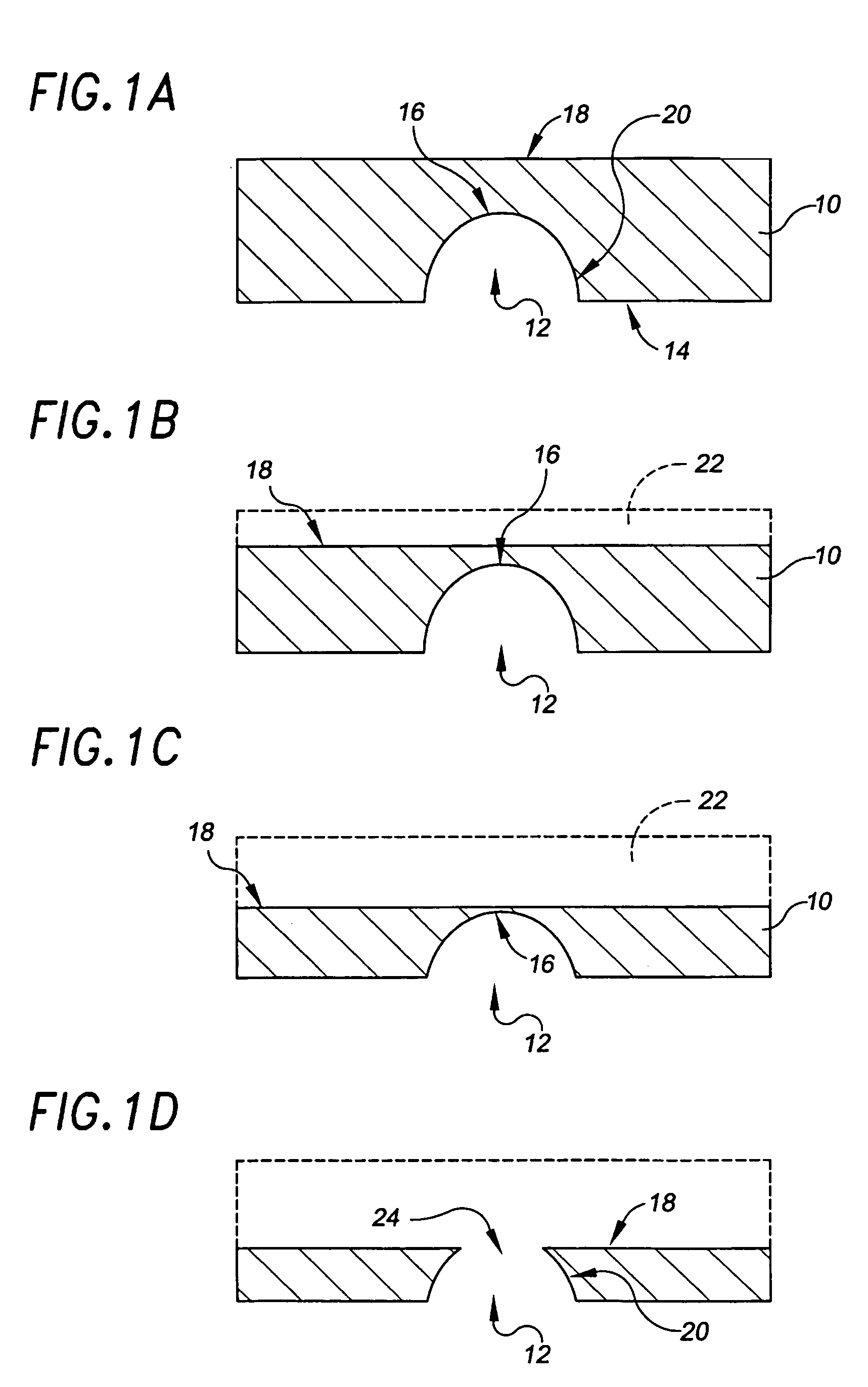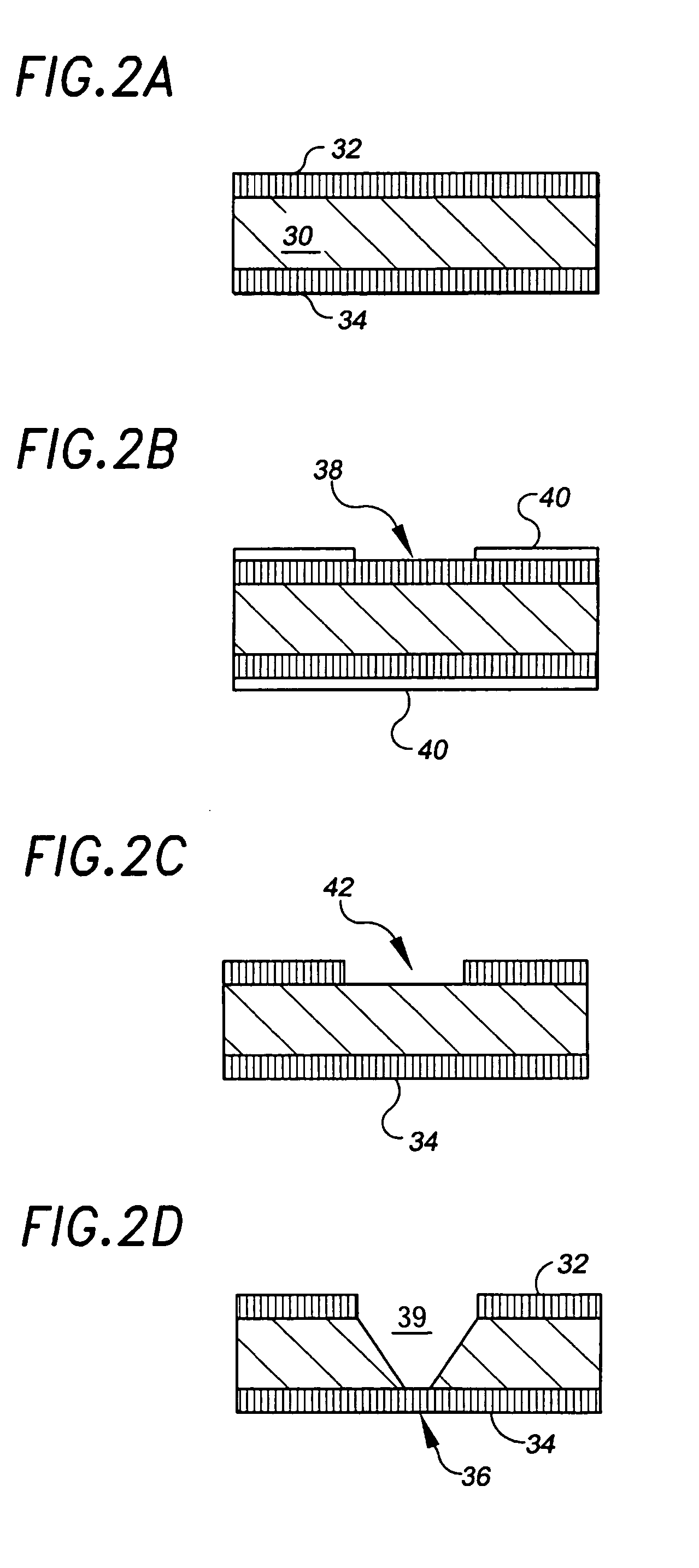Pulsed ion beam control of solid state features
a technology of solid state structure and ion beam, which is applied in the direction of fluid speed measurement, chemical vapor deposition coating, lapping machine, etc., can solve the problems of inability to reproduce or predictably control the requisite nano-scale features, inability to control on a time scale commensurate with the time scale, and inability to manufacture many systems that include nano-metric feature dimensions and/or tolerances. practicable or economical,
- Summary
- Abstract
- Description
- Claims
- Application Information
AI Technical Summary
Benefits of technology
Problems solved by technology
Method used
Image
Examples
example 1
[0078]A 50 nm-thick silicon nitride membrane having a cavity formed on one surface was produced by the process outlined in FIGS. 2A–G. The silicon nitride was deposited by low pressure chemical vapor deposition. The cavity bowl was etched in the membrane by a reactive ion etch process. FIG. 4A is an electron micrograph of the cavity formed in the membrane.
[0079]The membrane surface opposite that including the cavity was exposed to an argon ion beam etch at an energy of about 3 KeV, and a flux of about 3 Ar+sec / nm2. The ion beam diameter was about 200 μm and the membrane temperature during the etch was maintained at about −120° C. The ion beam was directed toward the membrane for 1 sec during each 5 sec interval. During the etch process, ion detection and counting was carried out.
[0080]FIG. 4B is an electron micrograph of the membrane cavity including a 10 nm limiting aperture formed by thinning of the membrane. FIG. 4C is a plot of argon ion count / second as a function of sputtering ...
example 2
[0091]A silicon nitride membrane of about 50 nm in thickness was produced in the manner of FIGS. 2A–2E. An aperture was formed through the entire thickness of the membrane by reactive ion etch. This resulted in a 37 nm-wide aperture, an electron micrograph of which is shown in FIG. 5A. The membrane and aperture were then exposed to an argon ion beam at a flux of about 1.7 Ar+ / nm2 / sec and an energy of about 3 KeV. The ion beam was directed toward and away from the membrane to sputter for 1 second during each 5 second interval. The membrane was maintained at a temperature of about −102° C. during the ion beam exposure.
[0092]FIG. 5B is an electron micrograph of the 58 nm-wide aperture that resulted from 180 seconds of sputtering. FIG. 5C is a plot of counted ions / sec as a function of time. A generally linear relationship between ion counts as a function of time is demonstrated.
[0093]The invention does not require that the process being controlled by feedback be a subtractive process as...
example 3
[0099]A silicon nitride membrane of about 500 nm in thickness was produced in the manner of the process outlined in FIGS. 2A–E. An aperture was formed through the entire thickness of the membrane by reactive ion etching. FIG. 7A is an electron micrograph of the 95 nm-wide aperture that resulted from the etch.
[0100]The membrane and its aperture were then exposed to an argon ion beam flux at an energy of about 3 KeV, and a flux of about 47 Ar+ / sec / nm2. The membrane was maintained at a temperature of about 20° C. during ion flux exposure. The ion beam was directed to the membrane for 250 ms for each 1 sec time interval.
[0101]FIG. 7B is an electron micrograph of the membrane after exposure to the argon ion beam reduced the aperture diameter to about 3 nm. FIG. 7C is a plot of counted argon ions / sec as a function of time. A generally linear count rate is indicated for midpoints in the process.
[0102]Without being bound by theory, the inventors herein understand that the mechanisms underly...
PUM
| Property | Measurement | Unit |
|---|---|---|
| width | aaaaa | aaaaa |
| width | aaaaa | aaaaa |
| thickness | aaaaa | aaaaa |
Abstract
Description
Claims
Application Information
 Login to View More
Login to View More - R&D
- Intellectual Property
- Life Sciences
- Materials
- Tech Scout
- Unparalleled Data Quality
- Higher Quality Content
- 60% Fewer Hallucinations
Browse by: Latest US Patents, China's latest patents, Technical Efficacy Thesaurus, Application Domain, Technology Topic, Popular Technical Reports.
© 2025 PatSnap. All rights reserved.Legal|Privacy policy|Modern Slavery Act Transparency Statement|Sitemap|About US| Contact US: help@patsnap.com



